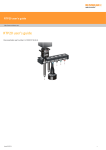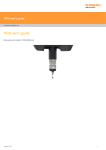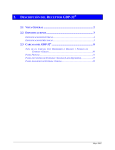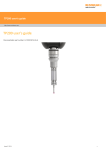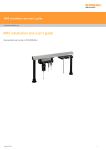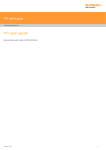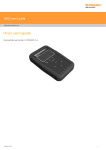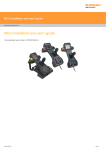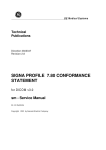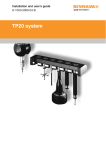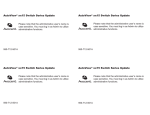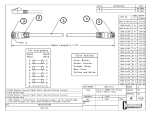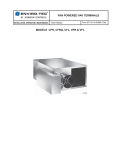Download MH20 and MH20i user's guide
Transcript
MH20 and MH20i user's guide http://www.renishaw.com MH20 and MH20i user's guide Documentation part number: H-1000-5195-05-A Issued 11 2014 1 MH20 and MH20i user's guide http://www.renishaw.com General information © 2002 2014 Renishaw plc. All rights reserved. This document may not be copied or reproduced in whole or in part, or transferred to any other media or language, by any means, without the prior written permission of Renishaw. The publication of material within this document does not imply freedom from the patent rights of Renishaw plc. Disclaimer RENISHAW HAS MADE CONSIDERABLE EFFORTS TO ENSURE THE CONTENT OF THIS DOCUMENT IS CORRECT AT THE DATE OF PUBLICATION BUT MAKES NO WARRANTIES OR REPRESENTATIONS REGARDING THE CONTENT. RENISHAW EXCLUDES LIABILITY, HOWSOEVER ARISING, FOR ANY INACCURACIES IN THIS DOCUMENT. Trademarks RENISHAW® and the probe emblem used in the RENISHAW logo are registered trademarks of Renishaw plc in the UK and other countries. apply innovation is a trademark of Renishaw plc. All brand names and product names used in this document are trade names, service marks, trademarks, or registered trademarks of their respective owners. Windows XP, Windows 2000, Vista and Windows 7 are registered trade names of the Microsoft Corporation. All trademarks and trade names are acknowledged. WEEE The use of this symbol on Renishaw products and/or accompanying documentation indicates that the product should not be mixed with the general household waste upon disposal. It is the responsibility of the end user to dispose of this product at a designated collection point for waste electrical and electronic equipment (WEEE) to enable reuse or recycling. Correct disposal of this product will help save valuable resources and prevent potential negative effects on the environment. For more information, please contact your local waste disposal service or Renishaw distributor. Warranty Renishaw plc warrants its equipment for a limited period (as set out in our Standard Terms and Conditions of Sale) provided that it is installed exactly as defined in associated Renishaw documentation. Prior consent must be obtained from Renishaw if non-Renishaw equipment (e.g. interfaces and/or cabling) is to be used or substituted. Failure to comply with this will invalidate the Renishaw warranty. Claims under warranty must be made from authorised service centres only, which may be advised by the supplier or distributor. Issued 11 2014 2 MH20 and MH20i user's guide http://www.renishaw.com Care of equipment Renishaw probes and associated systems are precision tools used for obtaining precise measurements and must therefore be treated with care. Changes to Renishaw products Renishaw reserves the right to improve, change or modify its hardware or software without incurring any obligations to make changes to Renishaw equipment previously sold. Patents Features of Renishaw's MH20 and MH20i products, and other associated and similar Renishaw products, are the subject of one or more of the following patents and / or patent applications: US6012230 Issued 11 2014 3 MH20 and MH20i user's guide http://www.renishaw.com Introduction The MH20 and MH20i are manually operated probe heads that articulate to provide orientation of the probing axis. MH20 provides nonrepeatable orientation, while MH20i permits repeatable indexing at 15° increments marked on the A and B axes. Both heads feature TP20 kinematic (magnetic) probe mounting, allowing stylus module changes without the need for re-qualification. A range of shanks is available to suit most CMM quills. Issued 11 2014 4 MH20 and MH20i user's guide http://www.renishaw.com Product description MH20 The MH20 incorporates the TP20 kinematic mount with 2-axis adjustable swivel. The TP20 module is carried on the A-axis swivel and rotates through ±93° in the Zplane. The Baxis rotates through ±300° in the XY plane. A thumbwheel locks the swivel in any position within the movement envelope of the head. After each adjustment qualification must take place. Module changing is possible without requalification. MH20i The MH20i incorporates the TP20 kinematic mount with 2-axis indexing. The TP20 module is carried on the A-axis swivel and rotates through 90° in the Zplane. The Baxis rotates through ±180° in the XY plane. The axes are unlocked by releasing the locking lever allowing rotation to each position. Positions are set at angular increments of 15° in each axis, providing a total of 168 positions. When head orientation is locked, the probe is fully kinematically constrained in a highly repeatable spatial position. This means that after initial qualification of the stylus tip, the probe may be moved to any of the qualified positions without the need for requalification during a gauging routine. MH20 and MH20i The red LED on the front of the head indicates probe status, and can be controlled by either the CMM or a Renishaw probe interface. Conventionally LED ON indicates probe seated (armed), and LED OFF indicates probe triggered. Electrical connection is via a 5-pin DIN connector. Issued 11 2014 5 MH20 and MH20i user's guide http://www.renishaw.com MH20 specification Measuring performance See 'TP20 probe module' for TP20 performance details. Technical data Range of articulation Aaxis 93° Baxis 300° Dual axis lock Single rotary thumbwheel Mounting MS/T range of shanks Cable connection 5-pin DIN socket Probe status indication 1 LED Maximum load EM2 - 94.5 mm (3.72 in) extension module Operating temperature range +10 °C to +40 °C (+50 °F to +104 °F) Storage temperature range 10 °C to +70 °C (+14 °F to +158 °F) Probe mount TP20 kinematic Weight - without shank 100 g (3.53 oz) Issued 11 2014 6 MH20 and MH20i user's guide http://www.renishaw.com All dimensions are nominal * See 'TP20 specifications'. Issued 11 2014 7 MH20 and MH20i user's guide http://www.renishaw.com Pin no. Function 1 LED cathode 2 Ground 3 LED anode 4 Probe circuit 5 Probe circuit Issued 11 2014 8 MH20 and MH20i user's guide http://www.renishaw.com MH20i specification Measuring performance Positional repeatability (2σ) At stylus tip with TP20 standard force module and 10 mm (0.39 in) stylus length 1.5 µm (0.00006 in) At stylus tip with EM2 94.5 mm (3.72 in) extended module and stylus 10 mm (0.39 in) long 2.5 µm (0.0001 in) Technical data Range of articulation Aaxis 0° to 90° in 15° increments Baxis ±180° in 15° increments Dual axis lock Single lock lever Mounting MS range of shanks Cable connection 5-pin DIN socket Probe status indication 1 LED Maximum load EM2 - 94.5 mm (3.72 in) extended module Operating temperature range +10 °C to +40 °C (+50 °F to +104 °F) Storage temperature range 10 °C to +70 °C (+14 °F to +158 °F) Probe mount TP20 kinematic Weight - without shank 210 g (7.4 oz) Issued 11 2014 9 MH20 and MH20i user's guide http://www.renishaw.com All dimensions are nominal * See 'TP20 specifications'. Issued 11 2014 † From shank mounting face. 10 MH20 and MH20i user's guide http://www.renishaw.com Pin no. Function 1 LED catchode 2 Ground 3 LED anode 4 Probe circuit 5 Probe circuit Issued 11 2014 11 MH20 and MH20i user's guide http://www.renishaw.com MH20 and MH20i installation Mounting the shank to the probe head The MH20 and MH20i shanks are factory fitted and are selected by part no. when ordering (see 'Parts list') MH20 shanks cannot be removed MH20i To mount a shank to an MH20i sold without a shank, please observe the following procedure: Hold the shank in the recess on the top face of the MH20i Rotate the shank until four screw holes are aligned Fix the shank in place using only M3 × 5 mm screws (supplied) Progressively tighten with the 2.5 mm A/F hex key (supplied) Mounting the MH20 and MH20i head to the CMM The head is normally attached to the CMM quill using a shank to suit the CMM. For optimum shielding against EM phenomena it is recommended that the shank is grounded to the same electrical ground as the control system. Custom designed mountings are available, subject to approval from Renishaw's Custom Products Department. Please contact your supplier or Renishaw for further information. The head mounting must be rigid, as any movement during operation will introduce system measurement errors. If the head is replaced or repositioned in the quill, all head positions in current use must be re-qualified before making further measurements. NOTE: Remove plastic cap from kinematic mount prior to attaching a TP20 module. Keep in a safe place for future protection. Issued 11 2014 12 MH20 and MH20i user's guide http://www.renishaw.com MH20 operation NOTE: Ensure thumbwheel is unlocked one full turn before re-orientation. Failure to do this will result in excessive wear to the swivel anodised surfaces. Any wear to the swivel is cosmetic only and does not affect performance. To change the orientation of the probe: Unlock the head by turning the thumbwheel anti-clockwise one full turn Grip the base of the swivel (avoid touching the stylus or stylus module) and manoeuvre the head to the desired position Lock the head in position by turning the thumbwheel clockwise until tight (do not use excessive force) - the probe is now ready for qualification Qualify the stylus tip whenever the head is re-orientated Qualify the stylus tip(s) according to the CMM supplier's instructions Periodic re-qualification should be performed according to the following considerations: CMM supplier's recommendations, particularly in respect of temperature changes At the start of the working day or shift After an accidental collision After changing any measuring system component (except a pre-qualified TP20 module) If the initial state is unknown or uncertain Replacement thumbwheel If the thumbwheel is removed and then lost, a replacement can be ordered by quoting part no. A-4043-0120. Issued 11 2014 13 MH20 and MH20i user's guide http://www.renishaw.com MH20i operation NOTE: Ensure locking lever is in fully locked position before taking gauging points. To change the orientation of the probe: Unlock the head by turning the lock lever to the fully anti-clockwise position Grip the body of the probe (avoid touching the stylus or stylus module) and rotate the B-axis until the desired angle indication on the scale is adjacent to the Baxis reference mark, increments are in 15° Rotate the Aaxis until the desired angle indication on the scale is at the Aaxis reference position, increments are in 15° Lock the head by turning the lock lever to the fully clockwise position Qualify the stylus tip(s) according to the CMM supplier's instructions Change the orientation of the probe to the next desired position and qualify the stylus tip(s) Repeat the qualification process for all desired orientations and stylus tips Commence gauging, ensuring that the correct qualification data is recalled for each head position Periodic re-qualification should be performed according to the following considerations: CMM supplier's recommendations, particularly in respect of temperature changes. At the start of the working day or shift After an accidental collision After changing any measuring system component (except a pre-qualified TP20 module) If the initial state is unknown or uncertain Locking lever operation Issued 11 2014 14 MH20 and MH20i user's guide http://www.renishaw.com TP20 probe module This section covers the use and care of the TP20 probe modules for the MH20 and MH20i. Introduction The Renishaw TP20 probe module incorporates a kinematic coupling, which ensures highly repeatable stylus tip positioning. The range of modules comprises 5-way versions with length or trigger force options and a 6-way version. Probe modules fit directly onto the MH20 and MH20i kinematic mount. It is possible to change TP20 modules with different stylus configurations without re-qualification. TP20 probe specification - standard force module described Sense directions - 5-way ±X, ±Y, +Z Unidirectional repeatability * 0.35 µm (0.000014 in) (2 sigma) Module changing repeatability ** ±1 µm, (0.000039 in) XY pre-travel variation * ±0.8 µm, (0.000031 in) Trigger force (non adjustable) *** XY 0.08 N, 8 gf, 0.29 ozf Z 0.75 N, 76.5 gf, 2.7 ozf TP20 module pull-off force 10 N, 1 kgf, 36 ozf max Renishaw styli with M2 thread fit the TP20 probe module. * ** Specified with standard force TP20 module with PS12R stylus and Renishaw PI 4-2 interface This can be achieved by taking care when changing modules (see 'Fitting the probe module with stylus on the MH20 or MH20i') *** See 'Probing forces and overtravel limits' for LF, SF, MF and EF trigger force values The probe module Each probe module houses the touch trigger mechanism that carries the stylus assembly. The module provides overtravel in the X, Y and Z axes. The M2 stylus mounting is compatible with Renishaw's comprehensive range of M2 styli. Electrical contact pins automatically complete the probe circuit. Trigger force and length option Seven versions of the TP20 probe module can be used with the MH20 and MH20i, they can be identified by the end cap colour. Issued 11 2014 15 MH20 and MH20i user's guide http://www.renishaw.com 1 Standard force (SF) probe module Black cap 2 Medium force (MF) probe module Grey cap 3 Extended force (EF) probe module Brown cap 4 Low force (LF) probe module Green cap 5 Extended module (EM1) 69.5 mm (2.74 in) long Black cap 6 Extended module (EM2) 94.5 mm (3.72 in) long Black cap 7 TP20 6-way probe module Blue cap Medium and extended force modules are used to overcome the effects of false triggers, caused either by stylus length and mass, or vibration caused by machine acceleration forces. The low force module permits the measurement of delicate objects. The EM1 and EM2 extended modules allow access to otherwise inaccessible workpiece features. Both operate using standard force and offer better measuring performance than using long styli with MF, or EF modules. The TP20 6-way senses in the +Z and -Z directions, allowing undercuts to be checked. Issued 11 2014 16 MH20 and MH20i user's guide http://www.renishaw.com Module Stylus length - minimum Stylus length - maximum Overall reach Low force (LF) 10 mm (0.39 in) 30 mm (1.18 in) 94 mm (3.70 in) Standard force (SF) 10 mm (0.39 in) 50 mm (1.96 in) 114 mm (4.49 in) Medium force (MF) 10 mm (0.39 in) 60 mm (2.36 in) 124 mm (4.88 in) Extended force (EF) 10 mm (0.39 in) 60 mm (2.36 in) 124 mm (4.88 in) 6-way (6W) 10 mm (0.39 in) 30 mm (1.96 in) 98 mm (3.86 in) EM1 10 mm (0.39 in) 50 mm (1.96 in) 143 mm (5.63 in) EM2 10 mm (0.39 in) 50 mm (1.96 in) 168 mm (6.61 in) TP20 installation Assembling the probe module and stylus 1. Select the probe module with the correct trigger force rating for the application (see 'TP20 module selector' and 'TP20 specifications'). 2. Fit the stylus to the probe module, first hand tightening then using the S7 stylus tool (supplied) for final tightness. Renishaw GF styli require an S20 spanner. The recommended tightening torque is 0.05 Nm to 0.15 Nm (0.04 lb ft to 0.11 lb ft). Torque must not exceed 0.3 Nm (0.22 lb ft). Issued 11 2014 17 MH20 and MH20i user's guide http://www.renishaw.com Fitting the probe module with stylus on the MH20 or MH20i 1. Examine all mating faces for cleanliness, where necessary clean the surfaces with the Renishaw CK200 cleaning kit. (supplied). 2. The TP20 module and kinematic mount are marked with three unique alignment marks. When offering the TP20 up to the probe head, ensure that similar marks are aligned with each other. Allow the TP20 body to engage under magnetic force. TP20 specifications Probing forces and overtravel limits Trigger force - nominal at stylus tip: Probe module stylus length LF 10 mm SF 10 mm MF 25 mm EF 50 mm EM1 10 mm EM2 10 mm TP20-6 way 10 mm XY 0.055 N 5.5 gf 0.19 ozf 0.08 N 8 gf 0.28 ozf 0.1 N 10 gf 0.35 ozf 0.1 N 10 gf 0.35 ozf 0.08 N 8 gf 0.28 ozf 0.08 N 8 gf 0.28 ozf 0.14 N 14 gf 0.49 ozf Z 0.65 N 65 gf 2.29 ozf 0.75 N 75 gf 2.64 ozf 1.9 N 190 gf 6.70 ozf 3.2 N 320 gf 11.29 ozf 0.75 N 75 gf 2.64 ozf 0.75 N 75 gf 2.64 ozf 1.6 N 160 gf 0.56 ozf Overtravel force - maximum at stylus tip: Probe module stylus length LF SF 10 mm 10 mm MF 25mm EF 50 mm EM1 10 mm EM2 10 mm TP20-6 way 10 mm XY 0.09 N 0.2 N - 0.3 N 0.2 N - 0.4 N 0.2 N - 0.5 N 0.2 N - 0.3 N 0.2 N - 0.3 N 0.25 N 9 gf 20 gf - 30 gf 20 gf - 40 gf 20 gf - 50 gf 20 gf - 30 gf 20 gf - 30 gf 25 gf 0.31 ozf 0.7 ozf - 1.1 ozf 0.7 ozf - 1.4 ozf 0.7 ozf - 1.8 ozf 0.7 ozf - 1.1 ozf 0.7 ozf - 1.1 ozf 0.88 ozf (+)Z 1.15 N .5 N 115 gf 350 gf 4.05 ozf 12.35 ozf 7N 700 gf 24.71 ozf 10 N 1000 gf 35.30 ozf 3.5 N 350 gf 12.35 ozf 3.5 N 350 gf 12.35 ozf 2.5 N 250 gf 8.83 ozf -Z - - - - - 9N 900 gf 31.8 ozf Issued 11 2014 - 18 MH20 and MH20i user's guide http://www.renishaw.com Overtravel displacement: Probe module stylus length LF 10 mm SF 10 mm MF 25mm EF 50 mm EM1 10 mm EM2 10 mm TP20-6 way 10 mm XY * ±14° ±14° ±14° ±14° ±14° ±14° ±14° (+)Z 3.1 mm (0.12 in) 4 mm (0.16 in) 3.7 mm (0.14 in) 2.4 mm (0.09 in) 4 mm (0.16 in) 4 mm (0.16 in) 4.5 mm (0.18 in) -Z - - - - - - 1.5 mm (0.06 in) * The module may become detached if this value is exceeded. Length: Probe module stylus length LF 10 mm SF 10 mm MF 25 mm EF 50 mm EM1 10 mm EM2 10 mm TP20-6 way 10 mm Length * 19.5 mm (0.77 in) 19.5 mm (0.77 in) 19.5 mm (0.77 in) 19.5 mm (0.77 in) 69.5 mm (2.74 in) 94.5 mm (3.72 in) 24.5 mm (0.96 in) * See 'MH20 dimensions' and 'MH20i dimensions' Module changing Issued 11 2014 Changed manually probe repeatability is ±1 µm 19 MH20 and MH20i user's guide http://www.renishaw.com Fault finding MH20 and MH20i Poor measuring performance: Possible cause Remedy Loose mounting. Ensure shank mounting screws are tight and mounting to CMM is secure. Problem with TP20 probe module (see 'TP20 installation'). Diagnosis of the probe unit should be carried out with axes correctly locked and without head adjustment between probe points. Problem with swivelling / indexing unit. Diagnosis of indexing unit should only be carried out following confirmation of satisfactory probe performance. No probe signal and / or no probe status LED: Possible cause Remedy Cable faulty / not connected. Check continuity of cabling from head to interface / machine control. Probe interface faulty / not connected. Ensure correct connection of interface/machine control. Poor repeatability (MH20i only): Possible cause Remedy Axes lock procedure incorrect. Ensure lock lever is fully rotated to lock position. Axes unlock procedure incorrect. Ensure lock lever is fully rotated to unlock position during indexing. Forces imparted onto head during lock-up. Unlock and re-lock holding lock lever only. Attempted lock-up in incorrect un-qualified position. Unlock, reposition correctly and re-lock. Axes ‘rattling' during indexing (MH20i only): Possible cause Remedy Incorrect unlock procedure. Ensure lock lever is fully rotated to unlock position. Incorrect indexing procedure. Index each axis separately. NOTE: The MH20 and MH20i are not user serviceable and should be returned to Renishaw if suspected faulty. Issued 11 2014 20 MH20 and MH20i user's guide http://www.renishaw.com TP20 module Poor measuring performance: Possible cause Remedy Stylus configuration too long or not rigid. Use shorter stiffer stylus configuration. Poor stylus assembly. Ensure stylus joints are kept to a minimum and that all joints are clean and secure. Contamination / damage of stylus ball. Inspect for damage, clean thoroughly with solvent. Trigger force too high. Use lower force module. Unwanted triggering during probe or CMM movement: Possible cause Remedy Trigger force too low / stylus configuration too heavy. Use higher force module / reduce mass of stylus configuration. Probe fails to rearm after trigger: Possible cause Remedy Trigger force too low / stylus configuration too heavy. Use higher force module / reduce mass of stylus configuration. Probe reseat failure. Re-trigger probe. If problem persists please return to Renishaw for service. Loss of measuring accuracy: Possible cause Remedy Mounting not secure. Check that the MH20i is correctly mounted on the shank and that the screws are secure. Check clamping mechanism in CMM quill is secure for MH20 and MH20i. MH20 / MH20i not fully locked. Ensure that the thumbwheel / lock lever is turned fully clockwise. Force imparted to probe module after locking. Re-qualify the probe. MH20 / MH20i worn or damaged. Use only with the specified probe and extension combinations. Faulty probe module. Check by substitution or return to Renishaw or your supplier. Issued 11 2014 21 MH20 and MH20i user's guide http://www.renishaw.com Maintenance Renishaw probes are intended for use in a protected metrology environment and therefore accumulation of dust or contamination should not occur. In common with all precision measuring equipment, regular inspection and cleaning is recommended to ensure continued high performance. Maintenance of the head is limited to wiping the outer surfaces and axes scale labels with a clean dry cloth or proprietary cleaning material. Maintenance of the TP20 probe is restricted to the periodic cleaning of the kinematic couplings on the probe head and the probe module. To aid cleaning of these couplings, the MH20 and MH20i are supplied with a Renishaw CK200 cleaning kit. Do not use any other cleaning method. When operating the TP20 probe in environments subjected to air-borne contamination, the user should determine the frequency of cleaning required. Issued 11 2014 22 MH20 and MH20i user's guide http://www.renishaw.com Parts list TP20 probe modules The MH20 and MH20i can be ordered with either LOW, STD, MED, or EXT force modules (see 'Head and shank combinations - MH20' and 'Head and shank combinations - MH20i' for details). If additional modules are required please refer to the table below for part numbers: TP20 modules Description Part number LOW A-1371-0392 STD A-1371-0270 MED A-1371-0271 EXT A-1371-0272 EM1 A-1371-0430 EM2 A-1371-0431 TP20 6-way A-1371-0419 Probe tools Description Part number S7 stylus tool kit (supplied) A-5000-7835 S20 stylus tool (not supplied) A-5003-2300 CK200 cleaning kit (supplied) A-1085-0016 Issued 11 2014 23 MH20 and MH20i user's guide http://www.renishaw.com Head and shank combinations - MH20 Description Part number MH20 + MS1/T shank A-4043-xx01 * MH20 + MS2/T shank A-4043-xx02 * MH20 + MS3/T shank A-4043-xx03 * MH20 + MS5/T shank A-4043-xx05 * MH20 + MS7/T shank A-4043-xx07 * MH20 + MS9/T shank A-4043-xx09 * MH20 + MS11/T shank A-4043-xx11 * MH20 + MS15/T shank A-4043-xx15 * MH20 + MS18/T shank A-4043-xx18 * * For LOW force module insert 00 * For STD force module insert 01 * For MED force module insert 02 * For EXT force module insert 03 e.g. For MH20 with STD force module and MS9/T shank the part number is: A-4043-0109. NOTE: For more information on the Renishaw shank range please refer to H-1000-5050. Issued 11 2014 24 MH20 and MH20i user's guide http://www.renishaw.com Head and shank combinations - MH20i Description Part number MH20i + MS1 shank A-4099-xx01 * MH20i + MS2 shank A-4099-xx02 * MH20i + MS3 shank A-4099-xx03 * MH20i + MS4 shank A-4099-xx04 * MH20i + MS5 shank A-4099-xx05 * MH20i + MS6 shank A-4099-xx06 * MH20i + MS7 shank A-4099-xx07 * MH20i + MS9 shank A-4099-xx09 * MH20i + MS10 shank A-4099-xx10 * MH20i + MS12 shank A-4099-xx12 * MH20i + MS13 shank A-4099-xx13 * MH20i + MS14 shank A-4099-xx15 * MH20i + MS15 shank A-4099-xx15 * MH20i + MS17 shank A-4099-xx17 * D shank A-4099-xx18 * * For LOW force module insert 00 * For STD force module insert 01 * For MED force module insert 02 * For EXT force module insert 03 e.g. For MH20i with MED force module and MS7 shank the part number is: A-4099-0207. NOTE: For more information on the Renishaw shank range please refer to H-1000-5050. Issued 11 2014 25 Renishaw plc New Mills, Wotton-under-Edge, Gloucestershire, GL12 8JR United Kingdom T +44 (0)1453 524524 F +44 (0)1453 524901 www.renishaw.com/cmmsupport For worldwide contact details, please visit our main website at www.renishaw.com/contact Issued 11 2014


























